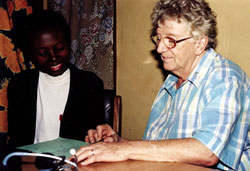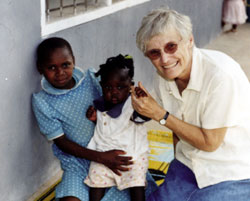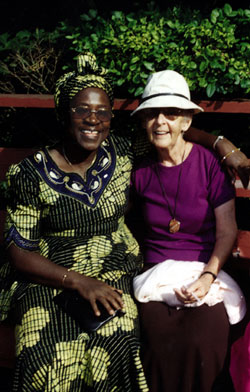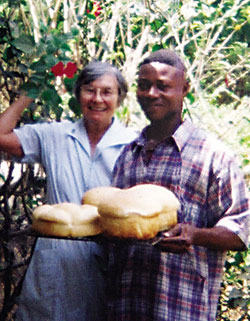An ounce of prevention
With a lack of basic health services, practicing preventative medicine reduces the incidence of some diseases and prevents others
By Sr. Mary Deighan, O.L.M.
Summer 2005
Return to Table of Contents
Print Article

Erdoo and Sr. Mary Deighan at the monthly support group for persons living with HIV/AIDS. There are six groups that meet once a month and receive treatment at the village health centre every Wednesday. Some are living positively and doing well. Some newly diagnosed are afraid, angry and sad. All worry about what will happen to their children and families in the future. Their courage is a gift to Sr. Mary. Benue State, Nigeria.

Little Iveren (centre) gets special attention from Sr. Rosemary Williamson. Sr. Rosemary works in pastoral care, the formation of lay leadership, and with women's groups. She also participates in a social justice group with young people who are looking at human rights issues and providing a ministry to prisoners.

Sr. Patricia Kay with her friend Sr. Ebegbule of the Holy Child Sisters, Vandeikya, Nigeria. Sr. Kay produces educational videos – biblical dramas and AIDS awareness dramas – with young people in Benue State. Her most recent project is a documentary in the local language on living positively with HIV/AIDS.

Sr. Gwen Legault writes: "'When the cares of my heart are many, your consolations cheer my soul' (Psalm 94:19) ...simple consolations like teaching a new bread recipe to Francis Zenda (pictured with Sr. Gwen) or admiring a hibiscus in full bloom outside our kitchen." Since her retirement from teaching at St. Francis School for the Deaf and Blind, Sr. Gwen has been working with the St. Vincent de Paul Society to help those most in need in the community. She also brings the Eucharist to shut-ins and visits the lonely. Vandeikya, Nigeria.
Mwuese was a beautiful young woman in her early 20s who came to one of the first village health posts we opened. Married at a young age, her first two babies died and for a few years it seemed she could no longer conceive. Now she was pregnant again. Like so many of the poor, she had never seen or talked to a trained health worker. We were able to give her prenatal care and to her joy, she delivered a healthy baby boy.
With proper immunizations (kept at cool temperatures with great effort in the tropical heat), Terkula, her child, escaped some major childhood diseases. He was treated at the health post for the unavoidable malaria, diarrhea and occasional parasitic infections to which children here are so prone. And he has lived to adulthood. Mwuese now has grandchildren of her own to delight her heart, and ours as well when she visits the clinic.
As we move into 2005, it is quite apparent that life in Nigeria has not been kind to the majority of its citizens. While most African countries managed to achieve an economic growth rate of about four percent in 2004, the poor of Nigeria experienced negative growth. Nowhere is this reflected in the lives of the people so much as in the lack of basic health services. Malaria, tuberculosis and HIV/AIDS are among the main sicknesses that cause so much living misery and in many cases death. And those affected often have had little or no treatment.
When I returned to Nigeria in 1984 hoping to work in the field of health care, it seemed obvious even then that Primary Health Care would be one of the most effective means of providing basic services to the poor in villages in the area where we live. I gradually built up a small team of health assistants to go out to village health posts, established in each case only after lengthy negotiations with the village elders.
We began to provide pre- and post-natal screening, immunizations for children against deadly childhood sicknesses, treatment of the most common ailments, as well as simple health teaching about nutrition, clean water and care of the sick. As the AIDS pandemic spread like wild fire, we all struggled to come to terms with it. We tried to meet the challenge of becoming as knowledgeable as possible about the changing nature of the HIV virus and about treatment in its many stages.
Another health care success story came as the result of a special drug called Mectizen provided by the World Health Organization. River blindness is endemic here in Vandeikya province. It is caused by the bite of a black fly living near slow running rivers. With Mectizen, the incidence of Oncocerciasis has drastically reduced over the years and scores of people have been saved from blindness.
If people can afford it, they pay a set fee for medical services at the village health posts. This fee helps to cover some of the costs for drugs, salaries and transportation. The London-based aid agency, CAFOD, gives an annual grant to help keep the program functioning but it cannot meet all our expenses. It is the support of family and friends over the years that has enabled Our Lady's Missionaries to be present in Nigeria and to practice preventative medicine: opening eight health posts, giving numerous health worker training courses, immunizing thousands of children, treating countless sick people, teaching health lessons. Because of these practices, we have reduced the incidence of some diseases and prevented others.
Thus it is no surprise to me to hear of a new emphasis on Primary Health Care as the first line of health defense in some areas of Canada and as an indispensable part of Canada's national medical service. After all, "An ounce of prevention is worth a pound of cure."
Return to Table of Contents
Print Article